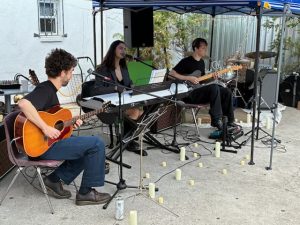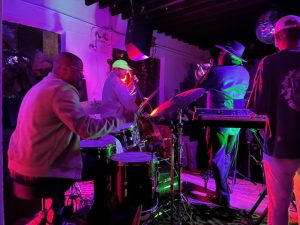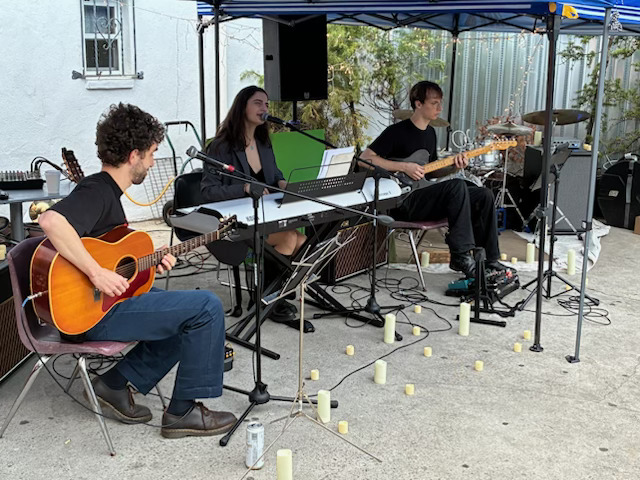
By: Zachary Weg
Zweg@queensledger.com
The Ridgewood Jazz Festival dazzled the neighborhood over
the weekend.
Started by award-winning jazz bassist, Michael Feinberg, the
festival was in its inaugural edition and displayed a range of musical
talent. For Feinberg, an Atlanta native who’s been a Ridgewood
resident for a decade, the event was especially meaningful.
“I had some experience doing curating, artistic directing
festivals before, and I had been booking my own groups for two
decades,” he says. “So I kind of just took all of those skills and put it
into the creation of an organization called Ridgewood Jazz, which is
not just this festival. We do other events in the neighborhood, and
it’s a community thing. Y’know, I spent 20 years on the road and so,
now, it’s nice that I get to walk to my gig.”
In addition to Dada Bar on Myrtle Avenue, the festival
primarily took place at Trans-Pecos on Wyckoff Avenue. A verdant
venue, with plants hanging from the rafters and a spacious
backyard, it was a fitting space for the relaxed atmosphere of the
festival. It also served as a respite for Feinberg after months of
preparation for the program.
“I’ve been working on this since October,” he says. “You
obsessively, 24/7 are doing things for this festival, thinking,
researching, making calls and emails, and all of this stuff. So when it
finally…here it is, y’know, we had a countdown on the website. 72
days away, 60, and I’m just staring at it, like, ‘We have how many
days left?’”

For the festival’s lineup, Feinberg sought musicians who defied
easy categorization. “I tried to keep a pretty varied program,” he
says. “We have all different types of artists who are in the ‘jazz’
spectrum. Jazz is one of those words that has really no specific
meaning. So, when you say ‘jazz’ to someone, are they thinking
about Miles Davis or Kenny G? Are they thinking about Stan Getz
plays Bossa Nova’s?
“Are they thinking about Preservation Hall, Louis Armstrong,
or Count Basie? These are all jazz. What’s cool is that almost none of
the artists are playing similar styles of music, but they all are
encapsulated in the umbrella of jazz. So that was really important.
Diversity is really important.”

Feinberg continues, “Having as much music, and bringing
different audiences together, so some that are more straight-ahead
jazz fans, some that are maybe more avant-garde, some that are
maybe into more electronic, some that are into Latin Jazz. We
wanted to bring all of those different audiences under one roof, into
one neighborhood. So there’s something for everybody, and
hopefully you get turned on to a new artist that you didn’t even
know about.”
One such artist is the twenty-four-year-old Montenegrin singer, Maša Vujadinović. Opening the festivities Saturday night, Vujadinović stunned attendees with her shattering soprano. Playing songs off her forthcoming EP, the musician delved into a kind of folk-jazz. She plays both the guitar and keyboards but it’s her elastic voice that makes her a revelation.
Playing a few feet away indoors was someone quite different:
the Nate Wood ‘Four,’ the number referring not to a quartet but
rather the different instruments Wood played. Holding a guitar
behind a drum kit and maneuvering some synthesizers as he sang,
the musician played pulsating electronica that got audience
members dancing.
Then, among several other performers during the weekend,
there was headliner, Karriem Riggins. A Detroit native who was a
close friend and collaborator of the late hip-hop savant, J Dilla,
Riggins is a drummer who has played with everyone from Ray
Brown to Earl Sweatshirt. An alchemist of jazz and hip-hop, he is
particularly special to Feinberg and was tapped by him to front the
festival.
“It’s just an honor to play the festival,” Riggins says. “Every
time I play in New York, it’s special. To be a part of this festival, and
to see the hard work that he’s [Feinberg] put into it, I’m honored to
be a part of it and for the people to come and receive it.”
As Feinberg, who would proceed Saturday night to play a sizzling set with Riggins, concludes, “Hopefully, in six months, in a year, or in five years, we see that this is inspiring other creators, producers, venues, and audiences to come here. What we don’t want is for these corporate venues…because, now, Ridgewood is getting popular, that you’re going to have a Live Nation venue that comes here and kind of ruins our community. Great, so now we have a concert venue that we’re bringing huge artists to, but that also is disenfranchising the people who are already here that make this neighborhood great, that make this scene happening.”



